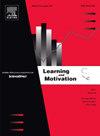促进学习者在课堂之外的繁荣和幸福:从自我决定理论的角度看语言学习中的建议作用
IF 1.7
4区 心理学
Q3 PSYCHOLOGY, BIOLOGICAL
引用次数: 0
摘要
本研究采用自我决定理论(SDT;Ryan, 2023)的视角来研究语言学习中的建议(Kato &;Mynard, 2016)和学习顾问的角色有助于满足语言学习者的基本心理需求,培养自主支持的学习氛围。这些需求被概念化为学习者在咨询会议中感知到个人所有权(自主性)、逐步掌握(能力)、接受和情感联系(相关性),从而在他们的学习过程和幸福感中产生积极的结果。SDT认为,促进需求满足的学习环境和社会支持激活学习者的自主动机,促进幸福和繁荣,并有助于适应功能。基于先前的研究(Shelton-Strong &;Tassinari(2022))本研究旨在提供关于如何满足学习者基本心理需求的新见解,并确定咨询过程中体验需求满足的相关益处。虽然许多教育领域的SDT研究都集中在教师在促进或阻碍需求支持条件方面的作用,但在文献中,学习顾问的独特作用仍然没有得到充分的体现。为了解决这一差距,本研究探讨了参与者在咨询关系中体验到的自主性、能力和相关性的程度,并确定了这种支持促进有利于基本心理需求满足的学习氛围的方式。研究结果表明,学习顾问在提供重要的需求支持体验方面发挥着关键作用,在学习过程中产生积极的结果,包括个人成长、有效应对策略的发展、体验希望、意义和代理参与。本文章由计算机程序翻译,如有差异,请以英文原文为准。
Promoting learner flourishing and well-being beyond the classroom: The role of advising in language learning from a self-determination theory perspective
This study adopts a Self-Determination Theory (SDT; Ryan, 2023) perspective to investigate how Advising in Language Learning (Kato & Mynard, 2016) and the role of the learning advisor contribute to satisfying language learners’ basic psychological needs and foster an autonomy-supportive learning climate. These needs are conceptualised as learners perceiving personal ownership (autonomy), progressive mastery (competence), acceptance and emotional connection (relatedness) within the advising sessions, leading to positive outcomes in their learning processes and well-being. SDT contends that learning environments and social supports that facilitate need satisfaction activate learners’ autonomous motivation, foster well-being and flourishing, and contribute to adaptative functioning. Building on previous research (Shelton-Strong & Tassinari, 2022) this study seeks to provide novel insights into how learners’ basic psychological needs are satisfied and identify associated benefits of experiencing need satisfaction resulting from the Advising process. While much of SDT research in education has focussed on the teacher’s role in enabling or hindering need-supportive conditions, the distinct role of the learning advisor remains underrepresented in the literature. To address this gap, this study explores the extent to which the participants experienced perceived autonomy, competence, and relatedness within the Advising relationship, and identifies ways this support facilitated a learning climate conducive to basic psychological need satisfaction. The findings indicate that learning advisors play a pivotal role in providing an important need-supportive experience, leading to positive outcomes including personal growth, the development of effective coping strategies, experiencing hope, meaning, and agentic engagement within the learning process.
求助全文
通过发布文献求助,成功后即可免费获取论文全文。
去求助
来源期刊

Learning and Motivation
Multiple-
CiteScore
2.90
自引率
0.00%
发文量
53
期刊介绍:
Learning and Motivation features original experimental research devoted to the analysis of basic phenomena and mechanisms of learning, memory, and motivation. These studies, involving either animal or human subjects, examine behavioral, biological, and evolutionary influences on the learning and motivation processes, and often report on an integrated series of experiments that advance knowledge in this field. Theoretical papers and shorter reports are also considered.
 求助内容:
求助内容: 应助结果提醒方式:
应助结果提醒方式:


